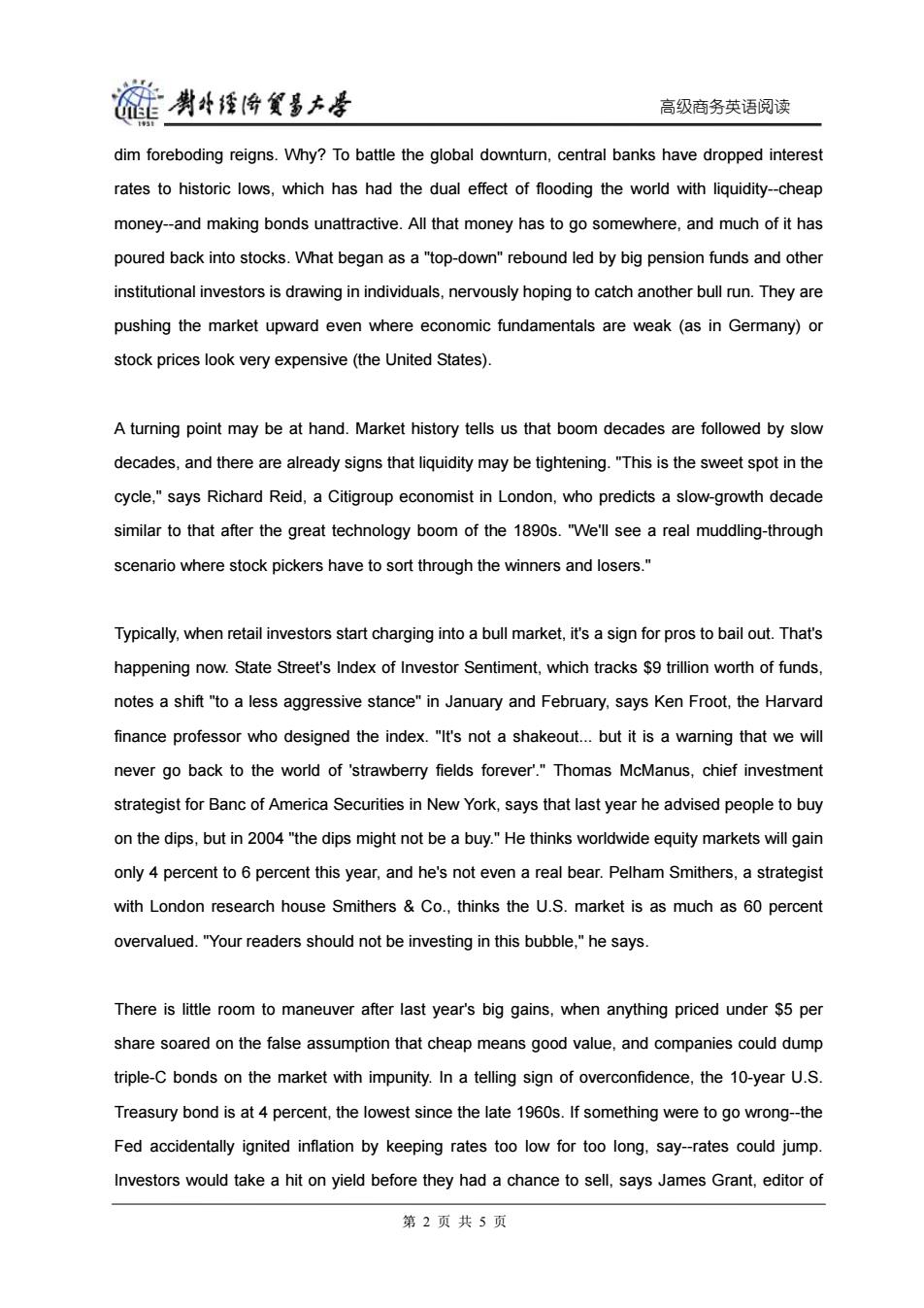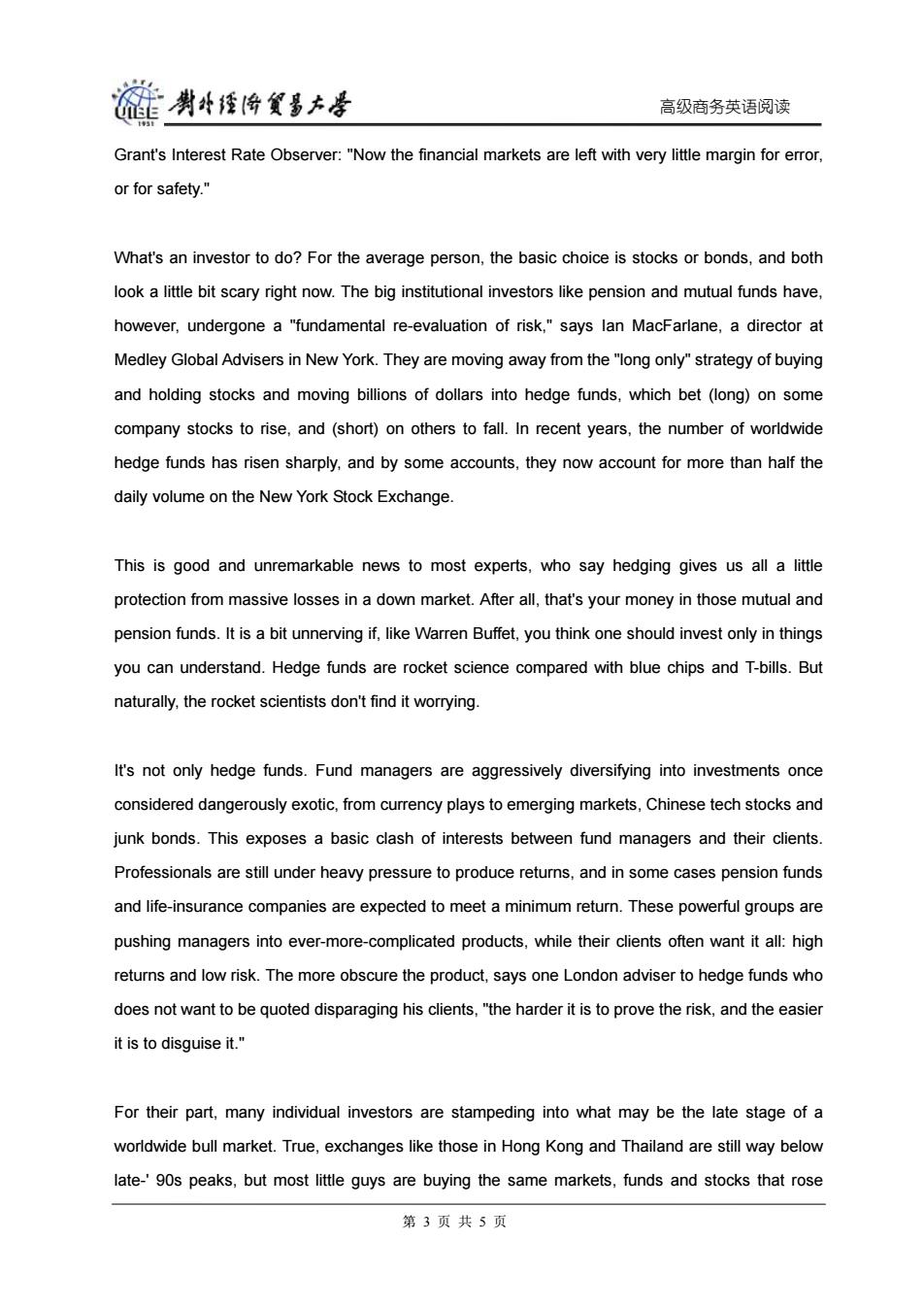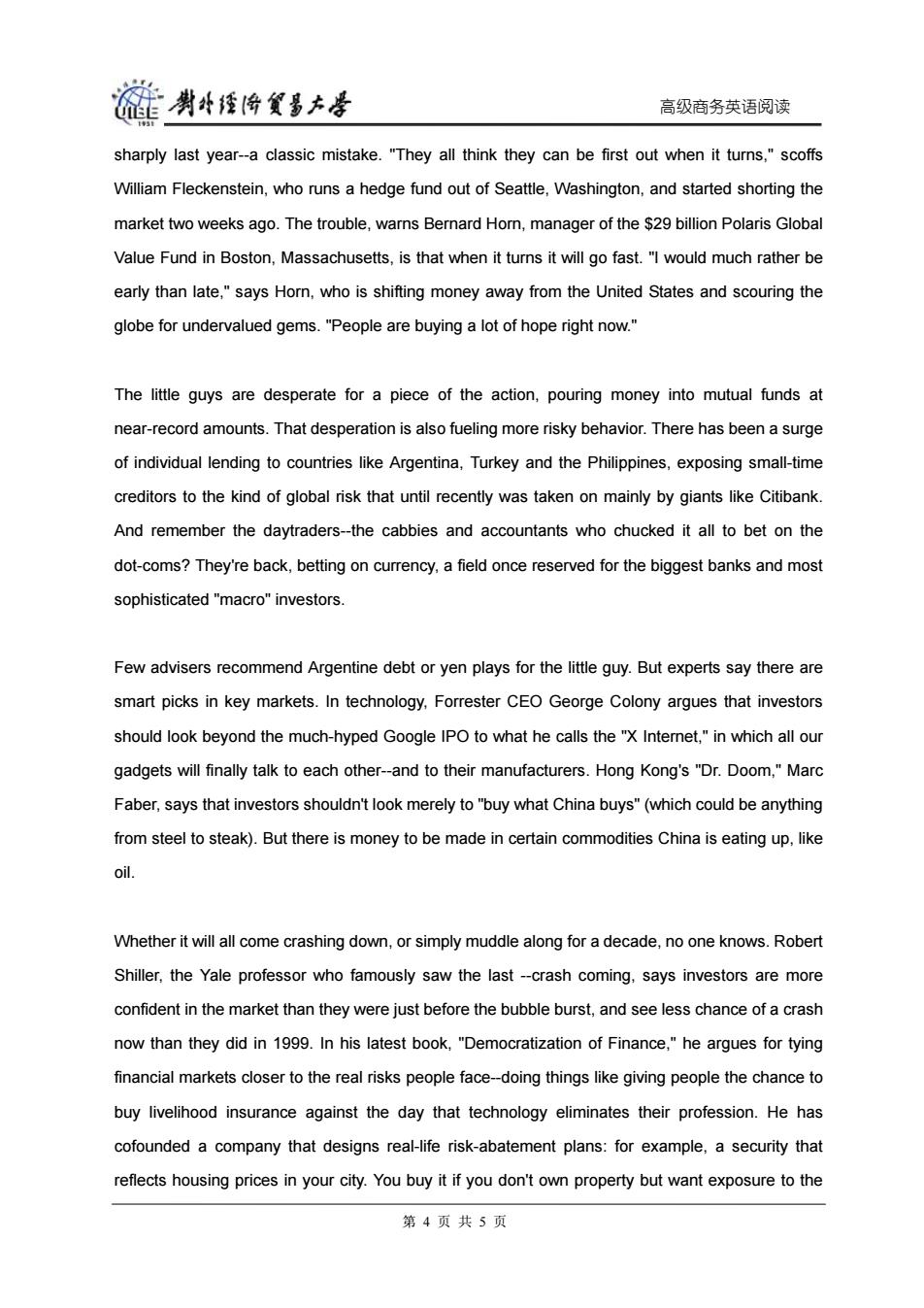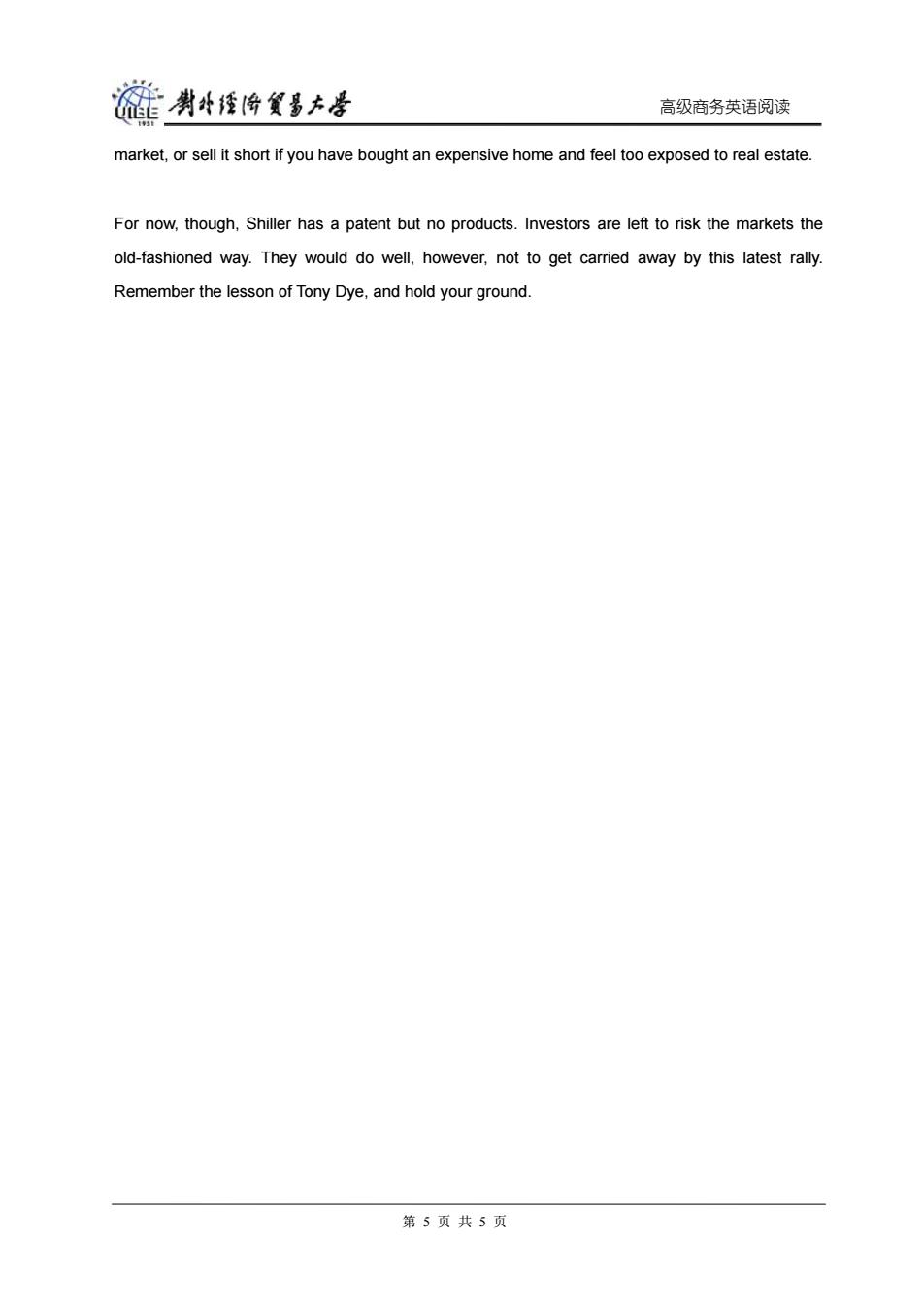
莲喇母矮将贸多大学 高级商务英语阅读 Supplementary Reading for Chapter 14 The Mutual Fund Mess A Risky World With recovery spreading,and the markets booming,why are investors so apprehensive about where to put all this easy money? by Karen Lowry Miller Tony Dye stood his ground in the dizzy spring of 2000.Distrusting the prices of tech stocks,the Phillips Drew investment strategist refused to buy.That April he was ushered out the door--and we all know what happened next in the markets."There is a dangerous incentive for professional investors to stay with a bubble,"says Dye,who now runs a hedge fund in London."If you lose it all, at least you're in the same boat as everyone else,so you keep your job."He won't discuss his current holdings,but when he looks at the equity markets now,"I'm terrified,"he says. The big difference today is that everyone is a bit chastened.In the United States,the pace of growth in the economy,productivity and stock prices is back up to the levels of the late 1990s,and yet there is no talk of miracles in the economy,or"irrational exuberance"in the markets.Something basic has been lost,and not only in the United States.In the 1990s,the old faith that blue-chip stocks were the best way to build wealth and guarantee a comfortable retirement gave way to the mass delusion that tech stocks were a sure way to become a millionaire.The investing minority became a majority in the United States."Equity culture"became a worldwide cult.But the democratization of the market democratized risks as well,which became all too clear with the crash.Wall Street contrarian Byron Wien says the new global mood is one of"apprehension"or at best"guarded optimism." Investors are re-entering the market with eyes more or less open to the risk.During the past 12 months,the markets are up 30 percent in New York and Tokyo,60 percent in Frankfurt,and yet a 第1页共5页
高级商务英语阅读 Supplementary Reading for Chapter 14 The Mutual Fund Mess A Risky World With recovery spreading, and the markets booming, why are investors so apprehensive about where to put all this easy money? by Karen Lowry Miller Tony Dye stood his ground in the dizzy spring of 2000. Distrusting the prices of tech stocks, the Phillips & Drew investment strategist refused to buy. That April he was ushered out the door--and we all know what happened next in the markets. "There is a dangerous incentive for professional investors to stay with a bubble," says Dye, who now runs a hedge fund in London. "If you lose it all, at least you're in the same boat as everyone else, so you keep your job." He won't discuss his current holdings, but when he looks at the equity markets now, "I'm terrified," he says. The big difference today is that everyone is a bit chastened. In the United States, the pace of growth in the economy, productivity and stock prices is back up to the levels of the late 1990s, and yet there is no talk of miracles in the economy, or "irrational exuberance" in the markets. Something basic has been lost, and not only in the United States. In the 1990s, the old faith that blue-chip stocks were the best way to build wealth and guarantee a comfortable retirement gave way to the mass delusion that tech stocks were a sure way to become a millionaire. The investing minority became a majority in the United States. "Equity culture" became a worldwide cult. But the democratization of the market democratized risks as well, which became all too clear with the crash. Wall Street contrarian Byron Wien says the new global mood is one of "apprehension" or at best "guarded optimism." Investors are re-entering the market with eyes more or less open to the risk. During the past 12 months, the markets are up 30 percent in New York and Tokyo, 60 percent in Frankfurt, and yet a 第 1 页 共 5 页

链男经降貿多大是 高级商务英语阅读 dim foreboding reigns.Why?To battle the global downturn,central banks have dropped interest rates to historic lows,which has had the dual effect of flooding the world with liquidity--cheap money--and making bonds unattractive.All that money has to go somewhere,and much of it has poured back into stocks.What began as a"top-down"rebound led by big pension funds and other institutional investors is drawing in individuals,nervously hoping to catch another bull run.They are pushing the market upward even where economic fundamentals are weak(as in Germany)or stock prices look very expensive(the United States). A turning point may be at hand.Market history tells us that boom decades are followed by slow decades,and there are already signs that liquidity may be tightening."This is the sweet spot in the cycle,"says Richard Reid,a Citigroup economist in London,who predicts a slow-growth decade similar to that after the great technology boom of the 1890s."We'll see a real muddling-through scenario where stock pickers have to sort through the winners and losers." Typically,when retail investors start charging into a bull market,it's a sign for pros to bail out.That's happening now.State Street's Index of Investor Sentiment,which tracks $9 trillion worth of funds, notes a shift"to a less aggressive stance"in January and February,says Ken Froot,the Harvard finance professor who designed the index."It's not a shakeout...but it is a warning that we will never go back to the world of 'strawberry fields forever'."Thomas McManus,chief investment strategist for Banc of America Securities in New York,says that last year he advised people to buy on the dips,but in 2004"the dips might not be a buy.He thinks worldwide equity markets will gain only 4 percent to 6 percent this year,and he's not even a real bear.Pelham Smithers,a strategist with London research house Smithers Co.,thinks the U.S.market is as much as 60 percent overvalued."Your readers should not be investing in this bubble,"he says. There is little room to maneuver after last year's big gains,when anything priced under $5 per share soared on the false assumption that cheap means good value,and companies could dump triple-C bonds on the market with impunity.In a telling sign of overconfidence,the 10-year U.S. Treasury bond is at 4 percent,the lowest since the late 1960s.If something were to go wrong--the Fed accidentally ignited inflation by keeping rates too low for too long,say--rates could jump. Investors would take a hit on yield before they had a chance to sell,says James Grant,editor of 第2页共5页
高级商务英语阅读 dim foreboding reigns. Why? To battle the global downturn, central banks have dropped interest rates to historic lows, which has had the dual effect of flooding the world with liquidity--cheap money--and making bonds unattractive. All that money has to go somewhere, and much of it has poured back into stocks. What began as a "top-down" rebound led by big pension funds and other institutional investors is drawing in individuals, nervously hoping to catch another bull run. They are pushing the market upward even where economic fundamentals are weak (as in Germany) or stock prices look very expensive (the United States). A turning point may be at hand. Market history tells us that boom decades are followed by slow decades, and there are already signs that liquidity may be tightening. "This is the sweet spot in the cycle," says Richard Reid, a Citigroup economist in London, who predicts a slow-growth decade similar to that after the great technology boom of the 1890s. "We'll see a real muddling-through scenario where stock pickers have to sort through the winners and losers." Typically, when retail investors start charging into a bull market, it's a sign for pros to bail out. That's happening now. State Street's Index of Investor Sentiment, which tracks $9 trillion worth of funds, notes a shift "to a less aggressive stance" in January and February, says Ken Froot, the Harvard finance professor who designed the index. "It's not a shakeout... but it is a warning that we will never go back to the world of 'strawberry fields forever'." Thomas McManus, chief investment strategist for Banc of America Securities in New York, says that last year he advised people to buy on the dips, but in 2004 "the dips might not be a buy." He thinks worldwide equity markets will gain only 4 percent to 6 percent this year, and he's not even a real bear. Pelham Smithers, a strategist with London research house Smithers & Co., thinks the U.S. market is as much as 60 percent overvalued. "Your readers should not be investing in this bubble," he says. There is little room to maneuver after last year's big gains, when anything priced under $5 per share soared on the false assumption that cheap means good value, and companies could dump triple-C bonds on the market with impunity. In a telling sign of overconfidence, the 10-year U.S. Treasury bond is at 4 percent, the lowest since the late 1960s. If something were to go wrong--the Fed accidentally ignited inflation by keeping rates too low for too long, say--rates could jump. Investors would take a hit on yield before they had a chance to sell, says James Grant, editor of 第 2 页 共 5 页

醛肖经海食多大是 高级商务英语阅读 Grant's Interest Rate Observer:"Now the financial markets are left with very little margin for error, or for safety." What's an investor to do?For the average person,the basic choice is stocks or bonds,and both look a little bit scary right now.The big institutional investors like pension and mutual funds have, however,undergone a "fundamental re-evaluation of risk,"says lan MacFarlane,a director at Medley Global Advisers in New York.They are moving away from the"long only"strategy of buying and holding stocks and moving billions of dollars into hedge funds,which bet(long)on some company stocks to rise,and (short)on others to fall.In recent years,the number of worldwide hedge funds has risen sharply,and by some accounts,they now account for more than half the daily volume on the New York Stock Exchange. This is good and unremarkable news to most experts,who say hedging gives us all a little protection from massive losses in a down market.After all,that's your money in those mutual and pension funds.It is a bit unnerving if,like Warren Buffet,you think one should invest only in things you can understand.Hedge funds are rocket science compared with blue chips and T-bills.But naturally,the rocket scientists don't find it worrying. It's not only hedge funds.Fund managers are aggressively diversifying into investments once considered dangerously exotic,from currency plays to emerging markets,Chinese tech stocks and junk bonds.This exposes a basic clash of interests between fund managers and their clients. Professionals are still under heavy pressure to produce returns,and in some cases pension funds and life-insurance companies are expected to meet a minimum return.These powerful groups are pushing managers into ever-more-complicated products,while their clients often want it all:high returns and low risk.The more obscure the product,says one London adviser to hedge funds who does not want to be quoted disparaging his clients,"the harder it is to prove the risk,and the easier it is to disguise it." For their part,many individual investors are stampeding into what may be the late stage of a worldwide bull market.True,exchanges like those in Hong Kong and Thailand are still way below late-'90s peaks,but most little guys are buying the same markets,funds and stocks that rose 第3页共5页
高级商务英语阅读 Grant's Interest Rate Observer: "Now the financial markets are left with very little margin for error, or for safety." What's an investor to do? For the average person, the basic choice is stocks or bonds, and both look a little bit scary right now. The big institutional investors like pension and mutual funds have, however, undergone a "fundamental re-evaluation of risk," says Ian MacFarlane, a director at Medley Global Advisers in New York. They are moving away from the "long only" strategy of buying and holding stocks and moving billions of dollars into hedge funds, which bet (long) on some company stocks to rise, and (short) on others to fall. In recent years, the number of worldwide hedge funds has risen sharply, and by some accounts, they now account for more than half the daily volume on the New York Stock Exchange. This is good and unremarkable news to most experts, who say hedging gives us all a little protection from massive losses in a down market. After all, that's your money in those mutual and pension funds. It is a bit unnerving if, like Warren Buffet, you think one should invest only in things you can understand. Hedge funds are rocket science compared with blue chips and T-bills. But naturally, the rocket scientists don't find it worrying. It's not only hedge funds. Fund managers are aggressively diversifying into investments once considered dangerously exotic, from currency plays to emerging markets, Chinese tech stocks and junk bonds. This exposes a basic clash of interests between fund managers and their clients. Professionals are still under heavy pressure to produce returns, and in some cases pension funds and life-insurance companies are expected to meet a minimum return. These powerful groups are pushing managers into ever-more-complicated products, while their clients often want it all: high returns and low risk. The more obscure the product, says one London adviser to hedge funds who does not want to be quoted disparaging his clients, "the harder it is to prove the risk, and the easier it is to disguise it." For their part, many individual investors are stampeding into what may be the late stage of a worldwide bull market. True, exchanges like those in Hong Kong and Thailand are still way below late-' 90s peaks, but most little guys are buying the same markets, funds and stocks that rose 第 3 页 共 5 页

链勇经份贸多大圣 高级商务英语阅读 sharply last year--a classic mistake."They all think they can be first out when it turns,"scoffs William Fleckenstein,who runs a hedge fund out of Seattle,Washington,and started shorting the market two weeks ago.The trouble,warns Bernard Horn,manager of the $29 billion Polaris Global Value Fund in Boston,Massachusetts,is that when it turns it will go fast."I would much rather be early than late,"says Horn,who is shifting money away from the United States and scouring the globe for undervalued gems."People are buying a lot of hope right now." The little guys are desperate for a piece of the action,pouring money into mutual funds at near-record amounts.That desperation is also fueling more risky behavior.There has been a surge of individual lending to countries like Argentina,Turkey and the Philippines,exposing small-time creditors to the kind of global risk that until recently was taken on mainly by giants like Citibank. And remember the daytraders--the cabbies and accountants who chucked it all to bet on the dot-coms?They're back,betting on currency,a field once reserved for the biggest banks and most sophisticated "macro"investors. Few advisers recommend Argentine debt or yen plays for the little guy.But experts say there are smart picks in key markets.In technology,Forrester CEO George Colony argues that investors should look beyond the much-hyped Google IPO to what he calls the"X Internet,"in which all our gadgets will finally talk to each other--and to their manufacturers.Hong Kong's"Dr.Doom,"Marc Faber,says that investors shouldn't look merely to "buy what China buys"(which could be anything from steel to steak).But there is money to be made in certain commodities China is eating up,like oil. Whether it will all come crashing down,or simply muddle along for a decade,no one knows.Robert Shiller,the Yale professor who famously saw the last--crash coming,says investors are more confident in the market than they were just before the bubble burst,and see less chance of a crash now than they did in 1999.In his latest book,"Democratization of Finance,"he argues for tying financial markets closer to the real risks people face--doing things like giving people the chance to buy livelihood insurance against the day that technology eliminates their profession.He has cofounded a company that designs real-life risk-abatement plans:for example,a security that reflects housing prices in your city.You buy it if you don't own property but want exposure to the 第4页共5页
高级商务英语阅读 sharply last year--a classic mistake. "They all think they can be first out when it turns," scoffs William Fleckenstein, who runs a hedge fund out of Seattle, Washington, and started shorting the market two weeks ago. The trouble, warns Bernard Horn, manager of the $29 billion Polaris Global Value Fund in Boston, Massachusetts, is that when it turns it will go fast. "I would much rather be early than late," says Horn, who is shifting money away from the United States and scouring the globe for undervalued gems. "People are buying a lot of hope right now." The little guys are desperate for a piece of the action, pouring money into mutual funds at near-record amounts. That desperation is also fueling more risky behavior. There has been a surge of individual lending to countries like Argentina, Turkey and the Philippines, exposing small-time creditors to the kind of global risk that until recently was taken on mainly by giants like Citibank. And remember the daytraders--the cabbies and accountants who chucked it all to bet on the dot-coms? They're back, betting on currency, a field once reserved for the biggest banks and most sophisticated "macro" investors. Few advisers recommend Argentine debt or yen plays for the little guy. But experts say there are smart picks in key markets. In technology, Forrester CEO George Colony argues that investors should look beyond the much-hyped Google IPO to what he calls the "X Internet," in which all our gadgets will finally talk to each other--and to their manufacturers. Hong Kong's "Dr. Doom," Marc Faber, says that investors shouldn't look merely to "buy what China buys" (which could be anything from steel to steak). But there is money to be made in certain commodities China is eating up, like oil. Whether it will all come crashing down, or simply muddle along for a decade, no one knows. Robert Shiller, the Yale professor who famously saw the last --crash coming, says investors are more confident in the market than they were just before the bubble burst, and see less chance of a crash now than they did in 1999. In his latest book, "Democratization of Finance," he argues for tying financial markets closer to the real risks people face--doing things like giving people the chance to buy livelihood insurance against the day that technology eliminates their profession. He has cofounded a company that designs real-life risk-abatement plans: for example, a security that reflects housing prices in your city. You buy it if you don't own property but want exposure to the 第 4 页 共 5 页

旋剥经降贸墨去号 高级商务英语阅读 market,or sell it short if you have bought an expensive home and feel too exposed to real estate. For now,though,Shiller has a patent but no products.Investors are left to risk the markets the old-fashioned way.They would do well,however,not to get carried away by this latest rally. Remember the lesson of Tony Dye,and hold your ground. 第5页共5页
高级商务英语阅读 market, or sell it short if you have bought an expensive home and feel too exposed to real estate. For now, though, Shiller has a patent but no products. Investors are left to risk the markets the old-fashioned way. They would do well, however, not to get carried away by this latest rally. Remember the lesson of Tony Dye, and hold your ground. 第 5 页 共 5 页